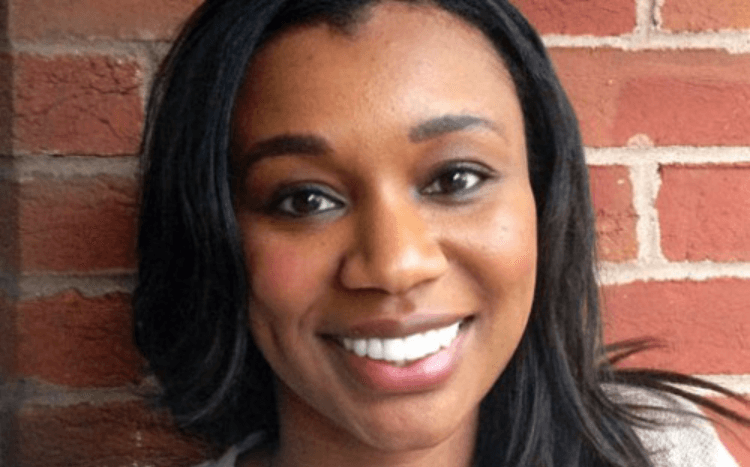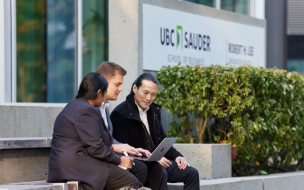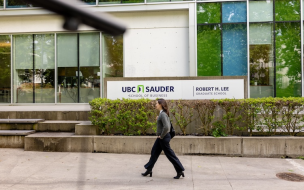Michelle has benefited from a number of social impact programs. Her roots can be traced back to her grandparents, who moved to inner-city Cleveland, Ohio with her mother. “My Nana made it very clear that if you get a good education, you won’t have to struggle,” Michelle tells me after class at Harvard.
“We lived with her from the age of four until she passed away when I was eleven. She worked as a maid and a Nanny for a family that owned a jewellery factory. She saw that the schools in the inner-city were not good quality, so she saved enough money for me to move to a middle-class neighbourhood.
“They wanted me to get a quality education, and that gave me the opportunities to be where I am now.”
Harvard is the number-one ranked business school in the world and it is an institution held in the deepest regard in the academic world; Harvard University is an entity in the US, founded 375 years ago and consistently associated with academic excellence. So it is surprising to hear that her mom, who is very proud of Michelle, at first didn’t understand the scale of her daughter’s achievement. “Because it’s not her world, she doesn’t realise how good Harvard is,” Michelle continues.
“She wasn’t even surprised when I got in, and she didn’t realise how important it was until she mentioned it to a neighbour on the street and they made a big deal out of it.”
I have no doubt that Michelle will join the ranks of a long list of successful Harvard MBAs once she graduates in 2016. She has achieved so much already. In 2009, she graduated from The Ohio State University with a BSBA in Accounting, a degree which she completed with a full scholarship from the Land Grant Opportunity scholars, an initiative for students from low income families. The National Black MBA Association also sponsored her $1000. In 2006, she worked for Nestlé and won a Diversity Scholarship from Ernst & Young, the prestigious consultancy firm, in 2008.
Michelle has worked as an Audit Intern at KPMG, the National City Bank in Ohio and, in 2011, as a Management Consultant Analyst for Accenture for almost two years. She has benefited from a raft of diversity and other social enterprise initiatives.
But her childhood was a world away from the success she has achieved later on in life. While most school children were concerned with their social standing, Michelle was forced to set goals from an early age. She feels responsible for her family, who have given her so much, and she still helps them financially today. “When you’re a kid you can have a hard time fitting in at school,” she reflects. “I was living in the suburbs but wasn’t quite in the middle-class income level. I had the mind-set through school and college that I was so disadvantaged.
“I used to see my friends get cars when they turned sixteen. I got a free lunch at school, and a simple thing like not being able to buy a drink at the vending machine, having to drink a free carton of milk while your friends buy their lunches every day, made me so motivated to want to do so well at school.”
Michelle’s passion comes across in an ecstatic yet lugubrious fashion. Although studying an MBA, her true motivation is to help children and schools that are less fortunate than she was. She cares about poverty alleviation and educational policy, and it is no surprise to hear that she began her career with Teach for America – a non-profit organization that seeks to eliminate educational in-equality by enlisting recent college graduates and professionals to teach in public schools across America. She was based in Houston, Texas where she taught at an elementary school.
“I’m so grateful,” she says. “Before I went to Teach for America, I didn’t have a clue. I came there claiming to be disadvantaged but really, I was so much more privileged than them.
“Because I had peers that didn’t worry about money, I always knew that I wasn’t at their level. But these kids all got free lunch, they were all poor and they didn’t know it because they were boxed into their communities; they didn’t know that they had less than the kids five miles down the road.
“It makes me so upset. It upsets me to realise that I’m a black American from a low income background and even I, who look like so many other disadvantaged people, couldn't begin to understand the challenges they face.
“I feel so responsible for them, to make sure that more people have that opportunity to work hard and get out of poverty.”
Michelle’s sense of responsibility to help those from disadvantaged backgrounds led her to take part in Quarterback, a social enterprise externship that BusinessBecause reported on last week, leaving her position at Accenture two months early. With just eight weeks until she was due to begin studying at Harvard, Michelle saw her colleagues leaving early and travelling around the world. But she didn’t have enough money to do the same. “I saw people quitting jobs and travelling but I didn’t have much money,” she says. “I didn’t feel that staying for two more months would make a difference to my learning.
“Someone on Facebook mentioned it and gave me the description. As soon as I saw it, I decided ‘wow, I want to work for them’. These programs are so important.” Michelle worked with Code 2040, a non-profit which aims to close the achievement, wealth and skills gaps for ethnic minorities in the US by creating access, awareness and opportunities in technology and engineering.
Michelle is enrolled in the MBA program at Harvard Business School, as well as a Masters of Public Policy at Harvard Kennedy School of Government. She will study Education Policy in this academic year, the MBA program in 2014-2015 and a combination of both in 2015-2016. She chose to get into business for the money, but Michelle says that it was difficult coming up with the cash to study at such a prestigious business school.
With a high quality education, there are high costs. The MBA class of 2015 at HBS can expect to pay as much as $56,175 in tuition. It was difficult coming into Harvard from a low income background. “A lot of people at Harvard have come from backgrounds with stronger networks, so it isn’t quite as foreign for them. I was almost on my own,” Michelle says.
“I didn’t even consider Harvard initially, so I think the advantage of coming from wealthier families is more about perception. I don’t think people from my background realise how qualified they are.
“In college and undergrad I realised I had to compete with peers that have parents and family members that worked at top companies, and could get them internships.
“So I went to INROADS, a social enterprise for minorities that places them in internships at Fortune 500 companies. I got to work for national banks and after my junior year I went into public accounting. It put me on the same level as some of my peers.”
While working with school children as a Teach for America Corps member, Michelle was made aware of the business skills needed to be successful in the education sector. She tells me how a principal she worked with didn’t budget properly, and the school ran out of paper in November. Most schools don’t finish teaching until the summer. “I was doing the best I could as a teacher but my frustration stemmed from the operation deficiencies,” she explains.
“To be effective I thought that maybe I needed to consider business, to be able to come back to education to make it more effective. It was a hard choice, but an MBA is the most important degree for me to get because that skillset is needed in education.”
Michelle is passionate about making education better across the United States. An MBA from Harvard is just a “stepping stone” onto that path. “I majored in business because I felt I needed financial security,” she says. “I couldn’t go and major in education because I felt responsible for my family, to make a certain amount of money.
“But I wanted to do something I really cared about. I’m still trying to figure it out because there are so many more opportunities than I was'nt aware of before I came to Harvard. Part of this journey is to get experience with my peers in the classroom and figure out what my true strengths are.
“But right now I’m leaning towards working in an organisation that does consulting for schools, that does needs assessments and then puts together a plan for those schools to improve. But I’m definitely not beholden to one idea: I just want to maximise the impact I can make.”
Michelle has overcome a remarkable set of challenges to become not just the first person in her family to study at college, but one of the most highly regarded business schools in the world. She is the embodiment of the American Dream, but her passion is to help others achieve their dreams too.
Armed with an MBA and a Masters of Public Policy from Harvard, her mission is only just beginning.
RECAPTHA :
c7
7b
dc
c0








